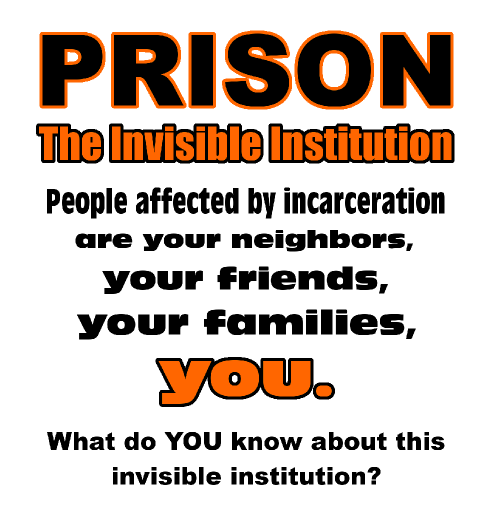Events Calendar

Fact Sheets
- Felony Disenfranchisement Laws in the U.S.
- Incarcerated Women
- Parents in Prison
- Trends in U.S. Corrections
- Facts About Prisons and Prisoners
- Does The World Need More Prisons? - Facts & Infographic
- Juvenile Life Without Parole
- Disproportionate Minority Contact in the Juvenile Justice Systeme
- Youth Reentry
Recommended Articles
Prison-related links
Ohio Organizations:
- Re-Examining the Lucasville Uprising Conference
- Lucasville Amnesty
Outlining the ongoing struggle of the Lucasville Uprising prisoners - The University of Toledo Inside/Out Prison Exchange Program
- CURE-Ohio
- American Civil Liberties Union of Ohio
- Innoceent Inmates Association of Ohio
- Prisoner Solidarity
- Redbird Prison Abolition
- Ohio Prison Watch
- Ohioans to Stop Executions
- Ohio Death Row
- Intercommunity Justice and Peace Center
- Ohio Prison Project
National Organizations:
Returning College Education to the Prisons
Campaign to Reinstate Pell Grant Funding:
College education in prison nearly disappeared after a “crime control” bill passed Congress (and was signed by President Bill Clinton) in 1994. Federal funding through the Pell Grants allowed inmates to earn college degrees during their incarceration. Today only a handful of privately funded programs remain, and secondary education in prisons, when available, focuses on vocational training. There is a renewed push to reinstate the Pell Grants for prisoners, which would shift the purpose of prisons toward rehabilitation instead of warehousing, give inmates hope, and decrease recidivism rates.
Drug Policy Initiative
The disastrous “war on drugs” is a major cause of the explosion of the U.S. prison population, creating a crisis of overcrowding. Sentencing policies also add to the racial disparities of prisons, since two-thirds of those incarcerated on drug charges are people of color. Most are nonviolent offenders. There are many ways to confront this issue, but it begins with local education and awareness.
Interfaith Alliance for Prison Awareness
Many faith communities are already involved in prison-related outreach, either directly or indirectly–from sponsoring a Citizens Circle, to assisting the homeless or unemployed whose problems may be a product of their incaceration. Our goal is to build a united front of “prison aware” congregations, churches, faith communities by first recognizing and coordinating what is already being done. Through an interfaith alliance, the invisible problem may become visible.
Prison Stories/Prison Realities
Much of what the general public knows about prisons comes from movies, television, and stereotypes. The tangled web of the prison system would be unrecognizable to the vast majority of people, who, if they even think about it at all, assume that prisons are places where bad people go. We are developing a resource bank of stories to reveal the everyday reality of today’s “injustice” system–for prisoners as well as their families.
Second Annual Prison Awareness Week
While the first Prison Awareness Week (April 8-12, 2013) focused on the University of Toledo student and faculty population, the Second Annual prison awareness week will reach out to a broad coalition of colleges and universities and the wide range of issues arising from the incarceration crisis.
Family Support Initiative
Families and friends have to be strong to help their loved ones deal with incarceration, to give them encouragement and hope. But families too need support and encouragement. Two groups of Families Behind Bars (Waterville and Toledo) meet monthly, offering a space where people can to talk about their situations, ask questions of others who have been through this same experience, and get basic information about what to expect–and how to navigate the institutional rules--now that a family member is in prison.
Reentry Support Initiative
Public agencies in Toledo and the region work separately and in coalition to offer assistance to ex-offenders. Communication is essential: knowing what is available (and what is not), who is being served (and who is not), and what opportunities may be in the offing. The Reentry Bridge keeps TPA informed.
Prison Programs/Education
Faculty from Criminal Justice, Law and Social Thought, Public Administration, English, and History at the University of Toledo have undergone training in this international program for prison education. An equal number of “inside” (prison) and “outside” (college) students meet inside Toledo Correctional and complete an accredited course, utilizing a specific pedagogy that is designed to "break down the walls between us." The relationships that develop have the potential to shift thinking, create new understandings of social issues, and inspire a positive change in the community inside and outside the prison walls.
Anyone–inside or outside–who has successfully completed an Inside/Out course can participate in a group that meets twice monthly, called People for Change, which serves as a bridge between UT and the prison. PFC produces a newsletter and helps support workshops in the prison, conducted by volunteers. For more information, contact Prof. Renee Heberle.


